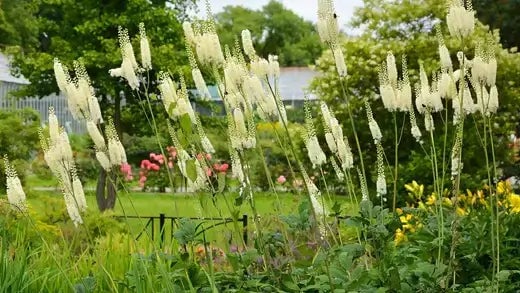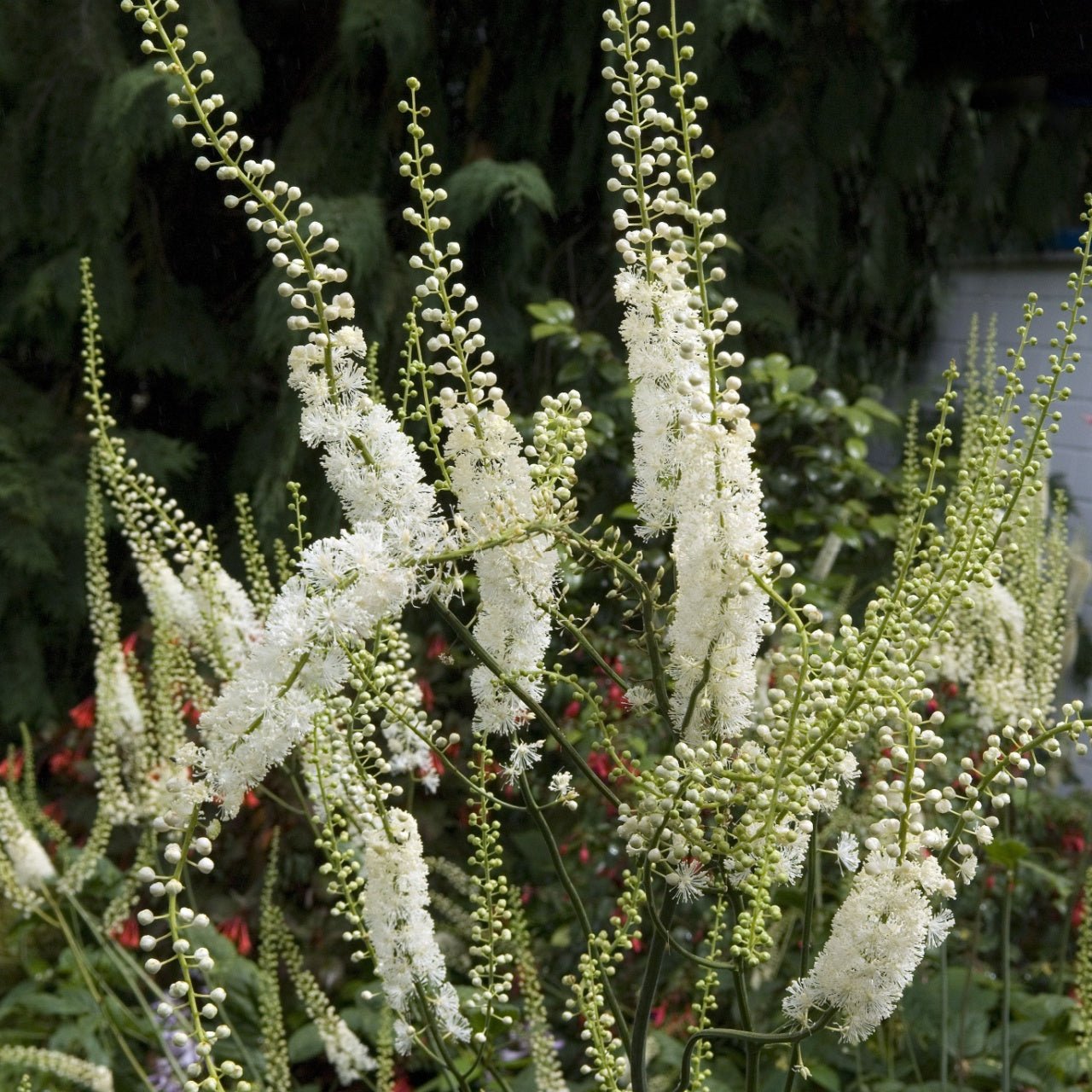Black Cohosh and Menopause: Exploring the Relationship and Benefits
Menopause is a natural biological operation that marks the end of a woman's reproductive years. It usually occurs between the ages of 45 and 55 and is characterized by a decrease in the production of estrogen and progesterone hormones. In recent years, there has been growing interest in using alternative and complementary therapies to manage these symptoms, and one such remedy that has gained attention is black cohosh.

Black Cohosh: An Overview: Black cohosh (Actaea racemosa) is a perennial herb native to North America with a long history of use in traditional Native American medicine. It has been traditionally used to treat various conditions, including menstrual irregularities, rheumatism, and menopausal symptoms.
The root of the black cohosh plant contains bioactive compounds such as triterpene glycosides, flavonoids, and other polyphenols, which are believed to contribute to its potential health benefits.
Menopausal Symptoms and Black Cohosh:
One of the primary reasons black cohosh has gained attention is its potential to alleviate menopausal symptoms. Research suggests that some compounds in black cohosh may have estrogenic effects, which could help compensate for the declining estrogen levels during menopause. Hot flashes, in particular, are a common and bothersome symptom of menopause.
Several studies have investigated whether black cohosh can help lower the frequency and harshness of hot flashes. Menopause is a natural physiological transition that marks the end of a woman's reproductive years. This hormonal change can lead to various physical and psychological symptoms that significantly impact a woman's quality of life.
Black cohosh (Actaea racemosa), an herbal remedy derived from the roots of the black cohosh plant, has gained attention for its potential to alleviate menopausal symptoms.
Understanding Menopausal Symptoms:
Menopause is accompanied by a range of symptoms, varying in severity and term among women. Some of the most common symptoms include: Hot Flashes and Night Candys: Hot flashes are sudden sensations of intense heat that often start in the face or chest and radiate throughout the body. They are sometimes followed by night sweats, which can disrupt sleep patterns.
Mood Changes: Hormonal fluctuations during menopause can lead to mood swings, irritability, anxiety, and even depression in some women.
Sleep Disturbances: Night sweats and other symptoms can interfere with sleep, leading to insomnia and daytime fatigue. Vaginal Dryness and Discomfort: Decreased estrogen levels can cause vaginal dryness, itching, and discomfort during sexual intercourse. Cognitive Changes: Some women may experience memory, concentration, and cognitive function difficulties during menopause.
Black Cohosh and Menopausal Symptom Relief: Black cohosh has been a subject of interest in natural remedies for menopausal symptom relief. The herb is believed to possess compounds that might interact with estrogen receptors, contributing to its potential effects on reducing specific symptoms. Notably, its impact on hot flashes has been a significant research focus.
Hot Flashes and Night Sweats: Numerous studies have investigated the impact of black cohosh on hot flashes and night sweats. Some research suggests that black cohosh might help reduce the incidence and intensity of these symptoms.
A study published in Obstetrics & Gynecology in 2006 found that women taking black cohosh experienced a reduction in the frequency of hot flashes compared to those taking a placebo. However, other studies have yielded mixed results, with some showing no significant difference between black cohosh and placebo groups.
Mood Changes and Sleep Disturbances: While the primary focus of black cohosh research has been on hot flashes, there is limited evidence to suggest that it might also positively impact mood changes and sleep disturbances. Some women have reported improvements in these areas while taking black cohosh supplements, but more research is needed to establish a clear link. Vaginal Health and Cognitive
Function: Research into the effects of black cohosh on vaginal dryness and cognitive changes during menopause is more limited. However, some studies suggest that black cohosh might offer modest improvements in vaginal dryness and potentially support cognitive function, but further investigation is required.
Scientific Evidence: The scientific evidence on the effectiveness of black cohosh for menopausal symptoms is mixed. Some studies have shown promising results, though others have not found significant benefits. A review of randomized controlled trials published in the Cochrane Database of Systematic Reviews in 2012 concluded that black cohosh may reduce the frequency of hot flashes. Still, the evidence was not strong enough to make definitive conclusions. However, it's important to note that the quality of available studies varies, and more rigorous research is needed to establish the efficacy of black cohosh for menopausal symptom relief. Factors such as dosages, formulations, and treatment duration can also influence these studies' outcomes.
Other Potential Benefits: Aside from its potential effects on menopausal symptoms, black cohosh has been explored for its possible benefits in other areas of women's health. Some studies suggest it positively impacts bone health by influencing bone turnover markers, which benefits postmenopausal women.
Safety and Considerations: Black cohosh is generally considered safe for short-term use when taken at recommended dosages. However, concerns have been about its long-term safety and potential interactions with other medications. Some cases of liver toxicity have been reported, although they are rare.
Individuals with liver conditions or a history of liver problems should exercise caution and consult a healthcare professional before using black cohosh. As with any herbal remedy, you must inform your healthcare provider about any supplements you are taking, especially if you are pregnant, nursing, or have underlying health conditions.
Dosage and Forms: Black cohosh supplements are available in various forms, including capsules, tablets, extracts, and tinctures. The appropriate dosage can vary based on the state and concentration of the supplement. Since there is no standardized dose, following the dosing instructions on the product label is recommended, or consulting a healthcare provider for personalized guidance is advised.
Black cohosh has emerged as a potential natural remedy for managing menopausal symptoms and scorching flashes. While research results are inconsistent, some women report relief from their symptoms when using black cohosh supplements.
However, due to the variability in study outcomes and the need for more rigorous research, it's essential to approach black cohosh as a complementary option rather than a guaranteed solution. As with any health-related decision, it's advisable to consult a qualified healthcare professional before starting any new supplement regimen, especially if you have underlying health conditions or are taking other medications.
While black cohosh holds promise, individual responses can vary, and your healthcare provider can help you decide whether it's a suitable option for your specific needs.
Black Cohosh for Menopause: A Natural Support
The flowering plant known as Black cohosh (Actaea racemosa) originates from North America and possesses extensive traditional and herbal medicinal usage. Throughout the years, people started using black cohosh more because they believed it could be a natural treatment for menopause discomfort. Researchers continue to examine black cohosh's effectiveness as many people report symptom relief from menopause using this herb in different forms. This section provides an overview of the medicinal uses of black cohosh to support menopausal health.
Black cohosh shows promise as a treatment for symptoms including hot flashes and night sweats. The unexpected surges of heat and sweating interfere strongly with everyday activities, sleep quality, and general comfort. Black cohosh appears to interact with serotonin receptors, which could help regulate the hypothalamus' temperature control system. The plant contains active components called triterpene glycosides, which researchers have investigated for their effects on hormonal balance and symptom relief despite not being direct estrogen sources.
The herb black cohosh can be found in several dietary supplement formats, such as capsules, tablets, and liquid extracts. Standardized extracts are often chosen because they deliver consistent active compound levels in each dose. Products containing black cohosh extract are designed to provide daily doses ranging from 20 to 40 milligrams, but dosage recommendations differ. Users should begin treatment with black cohosh at a lower dose and then adjust as advised by a healthcare professional or following instructions from a trusted brand.
Black cohosh has possible benefits for vasomotor symptoms and can help improve mood and sleep problems during menopause. Hormonal changes during this transitional period cause mood swings and interrupted sleep, which lead to increased stress levels and fatigue. According to some research studies, black cohosh exhibits phytoestrogen-like activity, which helps reduce irritability and promotes better sleep by influencing specific neurotransmitter pathways. Although more studies are required to confirm its effectiveness, preliminary research alongside anecdotal evidence shows potential results.
Black cohosh is included in combination herbal formulas developed to support menopausal women. The blends contain black cohosh, which combines with other herbs, including red clover, dong quai, and chasteberry (vitex). This approach aims to support menopausal health by targeting various bodily pathways simultaneously. The unique properties of each ingredient introduce specific concerns and possible drug interactions, which makes professional medical advice essential before commencing any new supplement routine.
Black cohosh usually has a good safety profile, but monitoring possible side effects is essential. Certain people experience minor gastrointestinal issues along with headaches and dizziness. There are concerns about rare liver health impacts, which mean people with liver conditions or those on multiple medications must get a medical evaluation before using the product. Not everyone can safely use black cohosh as an herbal supplement, and people who are pregnant or breastfeeding should steer clear of it.
Black cohosh has potential as a natural treatment for some menopausal symptoms, but individual health history, symptom severity, and lifestyle choices will determine treatment results. Talking with a healthcare professional allows for a safe and personalized approach to managing menopausal health.
Read more

Blood Root - Sanguinaria Canadensis - is a Medicinal Perennial. It is native to North America, from Florida to the Great Lakes and even Canada. The rhizome was used to support respiratory health an...

Butterflies love flowers. Just make sure that the plants you are planting will attract these beautiful creatures, like Butterfly Bushes, Butterfly weed, New England Aster, Joe Pye weed and also Pu...



